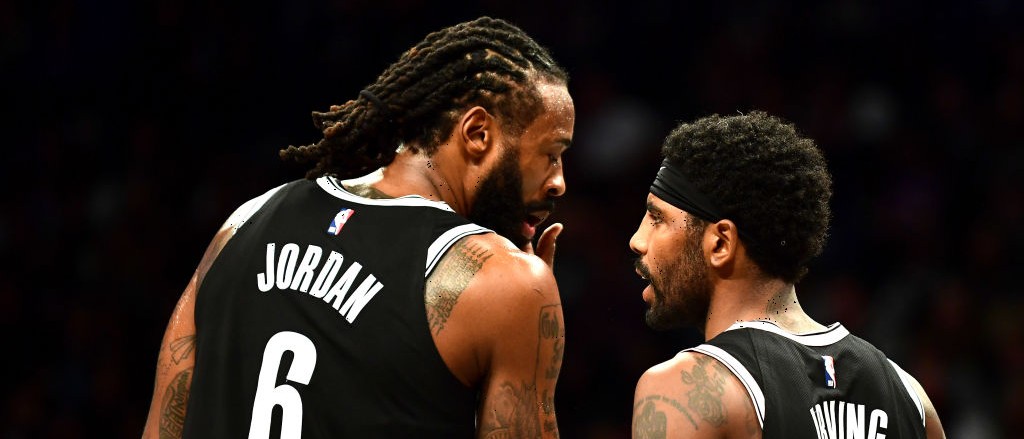The Brooklyn Nets are off to a 1-2 start to the season, with both losses coming in overtime by one point. While a perfect 3-0 start has narrowly escaped their grasp, Kyrie Irving appears more than comfortable in his new surroundings.
The All-Star guard is averaging 37.7 points, 6.3 assists, and 5.7 rebounds per game in his first three games as a Net and seems totally locked in to start the season. Given how his tenure with the Celtics ended, there’s plenty of eyeballs watching to see how Irving meshes with his new teammates, since there were apparent issues chemistry issues in Boston.
On Tuesday, our first report of some behind the scenes murmurs regarding Kyrie in Brooklyn emerged, as Jackie MacMullan of ESPN wrote a feature on the efforts of the Nets to harness all their talent and make them a cohesive unit. One of the lines that jumped out early on was one saying Irving’s “infamous mood swings … are the unspoken concern that makes Nets officials queasy.” She then offers an example of Irving reportedly “shutting down” at one point on the Nets trip to China, causing confusion as to what happened among the team.
After that story went live on Tuesday morning, the Nets had practice and DeAndre Jordan, Kenny Atkinson, and Spencer Dinwiddie all addressed the report and pushed back significantly on the idea that Kyrie’s attitude was at all an issue—- or that having mood swings was, in any way, unique to him. Via James Herbert of CBS Sports:
“That is completely false,” Atkinson said. “Strictly speaking in my observation and my experience with him so far, it’s absolutely not true. I’d say I’m the moody one. I really am. I hate to [say it]: I’m cranky, and I have my ups and downs. So if there’s just natural human behavior where guys are up and down, that’s different, but from my perspective I just give Kyrie an A-plus on his consistency and his spirit. It’s been great.”
“Everybody in the world goes through mood swings,” Jordan said. “I’m not saying that Kyrie [specifically] goes through mood swings; I go [through them], everybody goes through them. I mean, it’s a part of life and human nature. I just don’t think that it should be targeted at one person. If that’s the case, then say I have mood swings or Sean Marks has mood swings or Kenny Atkinson has mood swings. I don’t think that — whatever, it’s not affecting our team. I think that Kyrie’s a great guy. I don’t think that there’s anything negative that I’ve seen that he’s done. And he’s a friend of mine, so if it was, I would tell him.”
It’s not surprising that his teammates and coach would come to his defense, and also doesn’t necessarily mean the initial report, which referenced Nets officials, was at all wrong. What it does show is two things. First, Irving’s teammates and coaching staff are fully behind their new star guard and don’t see his “mood swings” as anything other than him being human. Second, the NBA still has a ways to go when it comes to discussing and dealing with mental health, particularly behind the scenes rather than making nice forward-facing statements.
Reading that Irving had times where he would turn inwards and “shut down” a bit socially could have felt very familiar for some folks. Hopefully the Nets organization looks at that and recognizes that this is a person that goes through things and processes those emotions in his own way and that sometimes that’s the byproduct. Instead of viewing that as a red flag, they could view it, simply, as a human reaction (as his teammates seem to) and look for ways they can help when those situations arise, or, just as well, be understanding in those moments.
The NBA’s new mental health initiative is a major step, but there’s still progress to be made in being more accepting of the various ways players are going to handle their emotions (especially the things we don’t know about happening privately in their lives) and not expecting everyone to just push through because they’re a pro athlete.







